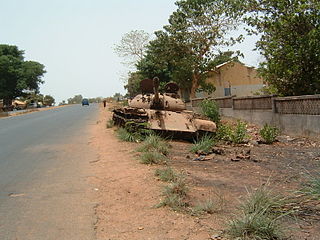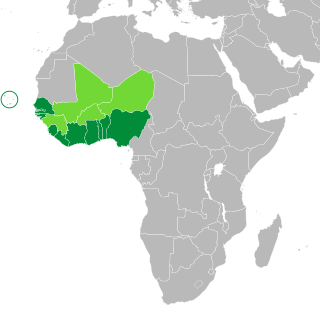
The United Nations Mission in Sierra Leone (UNAMSIL) was a United Nations peacekeeping operation in Sierra Leone from 1999 to 2006. It was created by the United Nations Security Council in October 1999 to help with the implementation of the Lomé Peace Accord, an agreement intended to end the Sierra Leonean civil war. UNAMSIL expanded in size several times in 2000 and 2001. It concluded its mandate at the end of 2005, the Security Council having declared that its mission was complete.

The Guinea-Bissau Civil War was fought from 7 June 1998 to 10 May 1999 and was triggered by an attempted coup d'état against the government of President João Bernardo Vieira led by Brigadier-General Ansumane Mané. Government forces, backed by neighbouring states, clashed with the coup leaders who had quickly gained almost total control over the country's armed forces.

The First Liberian Civil War was the first of two civil wars within the West African nation of Liberia. It lasted from 1989 to 1997. President Samuel Doe established a regime in 1980 but totalitarianism and corruption led to unpopularity and the withdrawal of the support of the United States by the late 1980s. The National Patriotic Front of Liberia (NPFL) led by Charles Taylor invaded Liberia from the Ivory Coast to overthrow Doe in December 1989 and gained control over most of the country within a year. Doe was captured and executed by the Independent National Patriotic Front of Liberia (INPFL), a splinter faction of the NPFL led by Prince Johnson, in September 1990. The NPFL and INPFL fought each other for control of the capital city, Monrovia and against the Armed Forces of Liberia and pro-Doe United Liberation Movement of Liberia for Democracy. Peace negotiations and foreign involvement led to a ceasefire in 1995 but fighting continued until a peace agreement between the main factions occurred in August 1996. Taylor was elected President of Liberia following the 1997 Liberian general election and entered office in August of the same year.

The Economic Community of West African States Monitoring Group (ECOMOG) was a West African multilateral armed force established by the Economic Community of West African States (ECOWAS). ECOMOG was a formal arrangement for separate armies to work together. It was largely supported by personnel and resources of the Nigerian Armed Forces, with sub-battalion strength units contributed by other ECOWAS members — Ghana, Guinea, Sierra Leone, The Gambia, Liberia, Mali, Burkina Faso, Niger, and others.

The United Nations Mission in Liberia (UNMIL) was a United Nations peacekeeping operation established in September 2003 to monitor a ceasefire agreement in Liberia following the resignation of President Charles Taylor and the conclusion of the Second Liberian Civil War (1999–2003). At its peak it consisted of up to 15,000 UN military personnel and 1,115 police officers, along with civilian political advisors and aid workers.

The United Nations Peacebuilding Support Office in Guinea-Bissau (UNOGBIS) was established by the United Nations Security Council in its Resolution 1233 in April 1999 to facilitate the general election and implementation of the Abuja Accord.

United Nations Security Council resolution 856, adopted unanimously on 10 August 1993, after reaffirming Resolution 813 (1993) and welcoming a peace agreement signed, under the auspices of the Economic Community of West African States (ECOWAS), between the Interim Government of National Unity of Liberia (IGNU), the National Patriotic Front of Liberia (NPFL), and the United Liberation Movement for Democracy (ULIMO), the Council approved a dispatch of 30 military observers to Liberia.

United Nations Security Council resolution 866, adopted unanimously on 22 September 1993, after reaffirming resolutions 813 (1993) and 856 (1993), the council noted that United Nations involvement would contribute significantly to the effective implementation of the peace agreement in Liberia and went on to establish the United Nations Observer Mission in Liberia (UNOMIL).

United Nations Security Council resolution 911, adopted unanimously on 21 April 1994, after reaffirming resolutions 813 (1993), 856 (1993) and 866 (1993), the Council welcomed progress made towards establishing the Liberian National Transitional Government but was concerned about subsequent delays in implementing the Cotonou Peace Agreement, and extended the mandate of the United Nations Observer Mission in Liberia (UNOMIL) until 22 October 1994.

United Nations Security Council resolution 972, adopted unanimously on 13 January 1995, after reaffirming resolutions 813 (1993), 856 (1993), 866 (1993), 911 (1994) and 950 (1994), the council discussed the peace process in Liberia and extended the mandate of the United Nations Observer Mission in Liberia (UNOMIL) until 13 April 1995.

United Nations Security Council resolution 1020, adopted unanimously on 10 November 1995, after recalling all resolutions on the situation in Liberia, particularly 1001 (1995), the Council discussed the implementation of the peace process during the First Liberian Civil War and adjusted the mandate of the United Nations Observer Mission in Liberia (UNOMIL) to include other functions.
United Nations Security Council resolution 1181, adopted unanimously on 13 July 1998, after recalling all previous resolutions on the situation in Sierra Leone, the council established the United Nations Observer Mission in Sierra Leone (UNOMSIL) to monitor the military and security situation in the country for an initial period of six months until 13 January 1999.

United Nations Security Council resolution 1233, adopted unanimously on 6 April 1999, after reaffirming Resolution 1216 (1998) on the situation in Guinea-Bissau, the council established the United Nations Peacebuilding Support Office in Guinea-Bissau (UNOGBIS) to facilitate the implementation of the Abuja Accord.

United Nations Security Council resolution 1270, adopted unanimously on 22 October 1999, after recalling resolutions 1171 (1998), 1181 (1998), 1231 (1999) and 1260 (1999) on the situation in Sierra Leone and Resolution 1265 (1999) on the protection of civilians in armed conflict, established the United Nations Mission in Sierra Leone (UNAMSIL) to assist in the implementation of the Lomé Peace Accord.

United Nations Security Council resolution 1464, adopted unanimously on 4 February 2003, after reaffirming its commitment to the sovereignty, territorial integrity and unity of Côte d'Ivoire, the council called for the implementation of the peace agreement signed at Linas-Marcoussis to end the civil war in the country.

United Nations Security Council resolution 1479, adopted unanimously on 13 May 2003, after reaffirming Resolution 1464 (2003) on the situation in Côte d'Ivoire and resolutions 1460 (2003) and 1467 (2003), the council established the United Nations Mission in Côte d'Ivoire (MINUCI) after determining the situation in the country to be a threat to international peace and security in the region.

United Nations Security Council resolution 1497, adopted on 1 August 2003, after expressing concern at the situation in Liberia, the Council authorised a multinational force to intervene in the civil war to support the implementation of a ceasefire agreement using "all necessary measures".

United Nations Security Council resolution 1509, adopted unanimously on 19 September 2003, after recalling all previous resolutions on the situation in Liberia, including Resolution 1497 (2003), the council established the 15,000-strong United Nations Mission in Liberia (UNMIL) to assist in implementing a ceasefire and peace agreement.

The United Nations Observer Mission in Sierra Leone (UNOMSIL) was a United Nations peacekeeping operation in Sierra Leone from 1998 to 1999 that was established with the passage of United Nations Security Council Resolution 1181. Its mission was to monitor the military and security situation in Sierra Leone. The mission was terminated in October 1999, when the Security Council authorized deployment of a new, and significantly larger peacekeeping operation, the United Nations Mission in Sierra Leone (UNAMSIL).
The 1998 Guinea-Bissau coup attempt was the attempted military overthrow in Guinea-Bissau by dissident elements within the military against the João Bernardo Vieira government. Led by Brigadier-General Ansumane Mané, the coup attempt plunged the republic into the year-long Guinea-Bissau civil war, resulting in as many as thousands of deaths and the displacement of hundreds of thousands.














